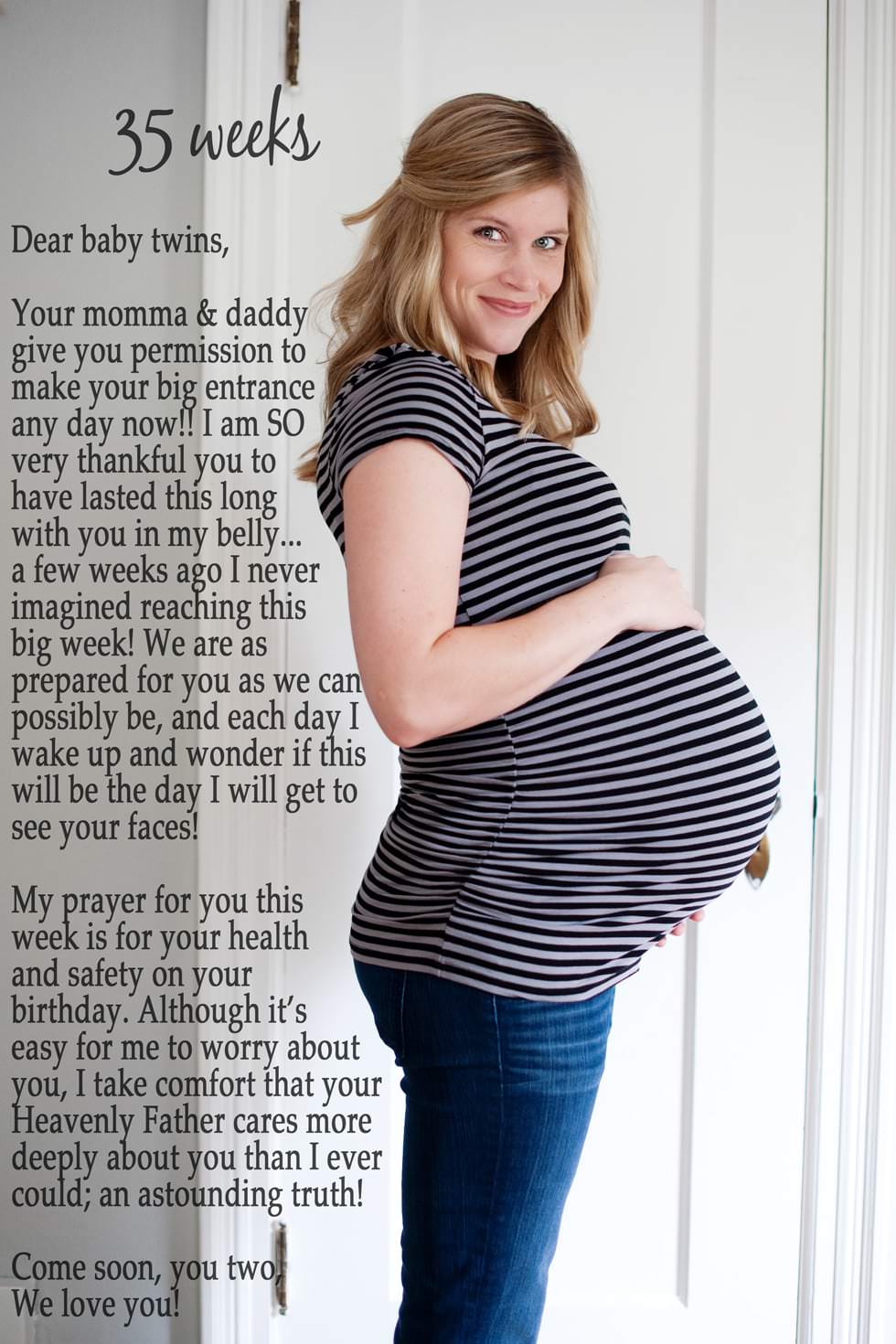
35 Weeks Pregnant with Twins: A Comprehensive Guide
Introduction
Congratulations on reaching 35 weeks of your twin pregnancy! This is a significant milestone, as you are now in the final stretch of your journey. While you may be feeling a mix of excitement and anticipation, it’s important to stay informed about the changes happening to your body and your babies. This comprehensive guide will provide you with all the essential information you need to know about week 35 of a twin pregnancy.
Physical Changes
- Uterus Size: Your uterus is now about the size of a large watermelon and continues to grow rapidly. This can put pressure on your bladder, causing frequent urination.
- Weight Gain: By this point, you may have gained between 25 and 35 pounds. Your weight gain will continue at a steady pace until delivery.
- Skin Changes: You may notice stretch marks on your abdomen, breasts, and thighs. These are caused by the rapid stretching of your skin.
- Swelling: Swelling in your hands, feet, and ankles is common during pregnancy, especially in the later stages.
- Back Pain: The weight of your growing uterus can put strain on your back, leading to back pain.
Fetal Development
- Size and Weight: Your twins are now about 18 inches long and weigh around 4.5 pounds each. They are filling out and gaining fat.
- Brain Development: Their brains are rapidly developing, and they are starting to learn and remember things.
- Lung Development: Their lungs are nearly fully developed and ready for breathing on their own.
- Movement: You may feel your babies moving less frequently as they run out of space in your uterus.
- Position: Your babies are likely head-down in preparation for birth.
Common Symptoms
- Heartburn and Indigestion: The growing uterus can push up on your stomach, causing heartburn and indigestion.
- Constipation: Hormonal changes and the pressure of your uterus on your intestines can lead to constipation.
- Hemorrhoids: Increased pressure on your veins can cause hemorrhoids, which are swollen and painful veins in the rectum.
- Varicose Veins: Varicose veins are enlarged, twisted veins that can appear on your legs or vulva.
- Pelvic Pain: You may experience pelvic pain as your body prepares for labor.
Medical Care
- Prenatal Visits: You will continue to have regular prenatal visits to monitor your health and the well-being of your babies.
- Ultrasound: Your doctor may order an ultrasound to check the position of your babies and assess their growth.
- Cervical Exam: Your doctor may perform a cervical exam to check for dilation and effacement.
- Blood Tests: You may have blood tests to check your iron levels and screen for gestational diabetes.
Preparing for Delivery
- Birth Plan: Discuss your birth plan with your doctor and make any necessary arrangements.
- Hospital Bag: Pack a hospital bag with essential items for you and your babies.
- Car Seat: Make sure you have two car seats installed in your vehicle.
- Childcare: Arrange for childcare for your other children, if applicable.
- Rest and Relaxation: Get plenty of rest and relaxation in the weeks leading up to delivery.
Tips for Managing Discomfort
- Elevate Your Feet: To reduce swelling, elevate your feet whenever possible.
- Use a Pregnancy Pillow: A pregnancy pillow can provide support and comfort for your back and belly.
- Take Warm Baths: Warm baths can help relieve muscle aches and pains.
- Stay Hydrated: Drink plenty of fluids to prevent dehydration and constipation.
- Exercise Regularly: Moderate exercise can help improve circulation and reduce back pain.
Warning Signs
Contact your doctor immediately if you experience any of the following symptoms:
- Vaginal Bleeding: Any amount of vaginal bleeding is a sign of a potential problem.
- Severe Abdominal Pain: Sudden or severe abdominal pain can indicate preterm labor or other complications.
- Premature Rupture of Membranes (PROM): If your water breaks before 37 weeks, it is considered PROM.
- Reduced Fetal Movement: If you notice a significant decrease in your babies’ movements, contact your doctor.
- Fever: A fever during pregnancy can be a sign of infection.
Conclusion
Week 35 of a twin pregnancy is a time of both excitement and preparation. By understanding the physical changes, fetal development, and common symptoms associated with this stage, you can ensure a healthy and comfortable pregnancy. Remember to follow your doctor’s instructions, take care of yourself, and enjoy the final weeks of your journey.